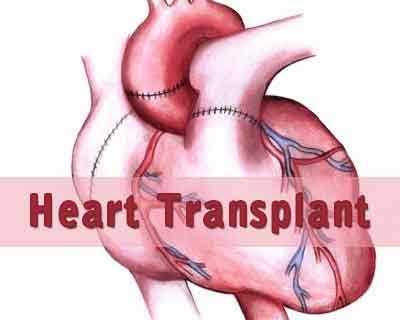- Home
- Editorial
- News
- Practice Guidelines
- Anesthesiology Guidelines
- Cancer Guidelines
- Cardiac Sciences Guidelines
- Critical Care Guidelines
- Dentistry Guidelines
- Dermatology Guidelines
- Diabetes and Endo Guidelines
- Diagnostics Guidelines
- ENT Guidelines
- Featured Practice Guidelines
- Gastroenterology Guidelines
- Geriatrics Guidelines
- Medicine Guidelines
- Nephrology Guidelines
- Neurosciences Guidelines
- Obs and Gynae Guidelines
- Ophthalmology Guidelines
- Orthopaedics Guidelines
- Paediatrics Guidelines
- Psychiatry Guidelines
- Pulmonology Guidelines
- Radiology Guidelines
- Surgery Guidelines
- Urology Guidelines
Heart transplant scenario in India very dismal: Health experts

Lack of infrastructure, logistical constraints, and myths and stigma attached to organ donation are the major hurdles keeping the rate of heart transplant in India at an "abysmal low" vis-a-vis in the west, according to health experts.
Cardiovascular diseases (CVDs) are the number one cause of death globally, leading to more deaths annually than from any other cause.
The World Heart Day is being observed globally today by doctors, experts and civil societies.
While an increasing population, including youth, is growing susceptible to heart ailments with changing lifestyle, doctors say the country is not catching up on heart donations which could save several lives.
"India's record when it comes to heart transplant is very dismal. One of the main factors is medical infrastructure and many times brain deaths in ICUs are not notified, thus losing precious time.
"Besides, there are logistical constraints, when the harvested heart doesn't reach in stipulated time through the green corridor," says Balram Airan, Professor of Cardiothoracic and Vascular Surgery at AIIMS.
Airan was part of the team at the premier institute which performed the country's first heart transplant at AIIMS on August 3, 1994.
Heart transplant is warranted for patients with end-stage heart failure or irreparable coronary artery disease. In this procedure, doctors replace the ailing heart with a healthy one harvested from a brain dead patient.
Mukesh Goel, Senior Consultant, Cardiovascular Surgery at Apollo Indraprastha Hospital here, says, in the country itself, "north India is lagging behind its southern counterpart".
"In the south, there are well laid-out procedures and government is very active, besides people being aware about organ donation. In Delhi and other parts of north India, the coordination work is quite informal and hence not smooth and efficient, leading to delay," Goel told PTI.
He says, at Apollo Indraprastha, "no transplant has been performed yet, but, there are four-five patients on waiting list, from Delhi and Ghaziabad and Bareilly, among other places."
Tamil Nadu is leading the way at present with nearly 200 transplants, Delhi about 50-60, Kerala 20, a single transplant in Rajasthan and nothing else from Lucknow to Kolkata, he said.
"Sometimes the harvested heart fails to reach the recipient in golden time due to lack of agency and traffic coordination. After harvesting, the heart must reach its recipient within 3-4 hours or it dies," says Rajeev Maikhuri, Senior Organ Transplant Coordinator at AIIMS.
Doctors also say that sometimes people refuse to donate organs due to superstition, like "they won't be getting that organ in next life, if donated."

Disclaimer: This site is primarily intended for healthcare professionals. Any content/information on this website does not replace the advice of medical and/or health professionals and should not be construed as medical/diagnostic advice/endorsement or prescription. Use of this site is subject to our terms of use, privacy policy, advertisement policy. © 2020 Minerva Medical Treatment Pvt Ltd